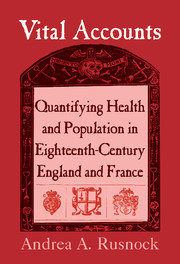Book contents
- Frontmatter
- Contents
- List of Illustrations
- Acknowledgments
- Vital Accounts
- Introduction
- 1 A New Science: Political Arithmetic
- PART ONE SMALLPOX INOCULATION AND MEDICAL ARITHMETIC
- PART TWO MEDICAL ARITHMETIC AND ENVIRONMENTAL MEDICINE
- PART THREE POLITICAL ARITHMETIC
- Conclusion
- Bibliography
- Index
- Titles in the series
Conclusion
Published online by Cambridge University Press: 15 October 2009
- Frontmatter
- Contents
- List of Illustrations
- Acknowledgments
- Vital Accounts
- Introduction
- 1 A New Science: Political Arithmetic
- PART ONE SMALLPOX INOCULATION AND MEDICAL ARITHMETIC
- PART TWO MEDICAL ARITHMETIC AND ENVIRONMENTAL MEDICINE
- PART THREE POLITICAL ARITHMETIC
- Conclusion
- Bibliography
- Index
- Titles in the series
Summary
In 1798, Thomas Malthus published his Essay on the Principle of Population in which he sought to convince the public of the threat of overpopulation after decades of debate over depopulation. Malthus's fear of overpopulation differed significantly from the long-standing anxiety over depopulation. The latter, as we have seen, was treated as a fundamental impediment to the wealth and strength of a nation, and accordingly, attention focused almost entirely on the external threats to a nation with a small or diminishing population: insufficient number of men to bear arms, too few laborers to till the fields, a decline in commerce and learning. Juxtapose this scenario with the internal threats provoked by overpopulation: hunger, death, and possible rebellion. Malthus's question was not one of good or despotic government, but of the ability to govern at all. Only an event as disruptive as the French Revolution could have produced such a radical change of perspective. The internal threats posed by the people of Paris, rather than the external threats of foreign armies, were held responsible for the excesses of the events in France. Looking around his own country, Malthus could only assume that the dislocations in population brought on by manufacturing would lead inevitably to a similar bloody outcome.
Malthus was not alone in expounding this emerging internal danger. Politicians in both Britain and France perceived the same unruly possibility, and for this reason, both governments imposed a national census in the early years of the nineteenth century.
- Type
- Chapter
- Information
- Vital AccountsQuantifying Health and Population in Eighteenth-Century England and France, pp. 211 - 218Publisher: Cambridge University PressPrint publication year: 2002



